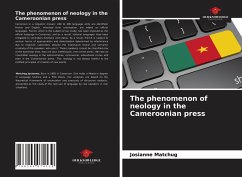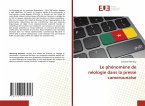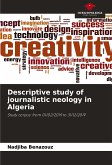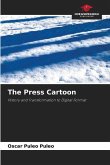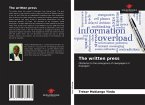Cameroon is a linguistic mosaic: 240 to 300 language units are identified. French and English, inherited from colonization, are added as official languages. French, which is the subject of our study, has been imposed as the official language in Cameroon, and as a result, national languages have been relegated to secondary functions and status. As a result, French is subject to various forms of appropriation and dialectization determined by interference due to linguistic substrates despite the impressive lexical and semantic creativity of the speakers who use it. These speakers cannot be classified only at the basilectal level, they are also intellectuals, men of the press. We note an irresistible neology in the administrative, commercial, educational circles and even in the Cameroonian press. This neology is not always faithful to the codified principles of creation of new words.
Bitte wählen Sie Ihr Anliegen aus.
Rechnungen
Retourenschein anfordern
Bestellstatus
Storno

